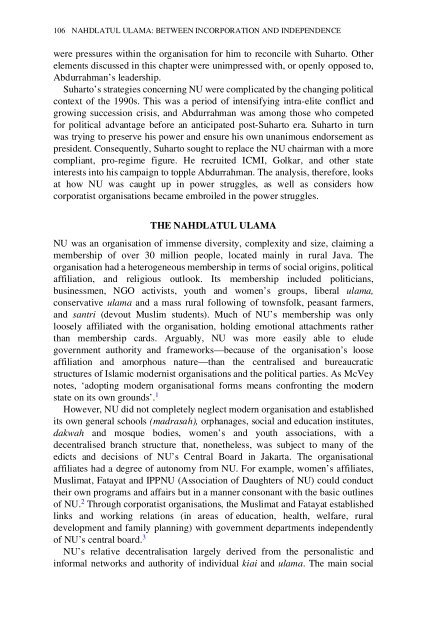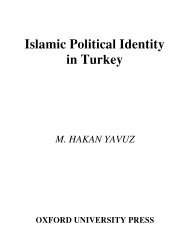You also want an ePaper? Increase the reach of your titles
YUMPU automatically turns print PDFs into web optimized ePapers that Google loves.
106 NAHDLATUL ULAMA: BETWEEN INCORPORATION AND INDEPENDENCEwere pressures with<strong>in</strong> the organisation for him to reconcile with Suharto. Otherelements discussed <strong>in</strong> this chapter were unimpressed with, or openly opposed to,Abdurrahman’s leadership.Suharto’s strategies concern<strong>in</strong>g NU were complicated by the chang<strong>in</strong>g politicalcontext of the 1990s. This was a period of <strong>in</strong>tensify<strong>in</strong>g <strong>in</strong>tra-elite conflict <strong>and</strong>grow<strong>in</strong>g succession crisis, <strong>and</strong> Abdurrahman was among those who competedfor political advantage before an anticipated post-Suharto era. Suharto <strong>in</strong> turnwas try<strong>in</strong>g to preserve his power <strong>and</strong> ensure his own unanimous endorsement aspresident. Consequently, Suharto sought to replace the NU chairman with a morecompliant, pro-regime figure. He recruited ICMI, Golkar, <strong>and</strong> other state<strong>in</strong>terests <strong>in</strong>to his campaign to topple Abdurrahman. The analysis, therefore, looksat how NU was caught up <strong>in</strong> power struggles, as well as considers howcorporatist organisations became embroiled <strong>in</strong> the power struggles.THE NAHDLATUL ULAMANU was an organisation of immense diversity, complexity <strong>and</strong> size, claim<strong>in</strong>g amembership of over 30 million people, located ma<strong>in</strong>ly <strong>in</strong> rural Java. Theorganisation had a heterogeneous membership <strong>in</strong> terms of social orig<strong>in</strong>s, politicalaffiliation, <strong>and</strong> religious outlook. Its membership <strong>in</strong>cluded politicians,bus<strong>in</strong>essmen, NGO activists, youth <strong>and</strong> women’s groups, liberal ulama,conservative ulama <strong>and</strong> a mass rural follow<strong>in</strong>g of townsfolk, peasant farmers,<strong>and</strong> santri (devout Muslim students). Much of NU’s membership was onlyloosely affiliated with the organisation, hold<strong>in</strong>g emotional attachments ratherthan membership cards. Arguably, NU was more easily able to eludegovernment authority <strong>and</strong> frameworks—because of the organisation’s looseaffiliation <strong>and</strong> amorphous nature—than the centralised <strong>and</strong> bureaucraticstructures of <strong>Islam</strong>ic modernist organisations <strong>and</strong> the political parties. As McVeynotes, ‘adopt<strong>in</strong>g modern organisational forms means confront<strong>in</strong>g the modernstate on its own grounds’. 1However, NU did not completely neglect modern organisation <strong>and</strong> establishedits own general schools (madrasah), orphanages, social <strong>and</strong> education <strong>in</strong>stitutes,dakwah <strong>and</strong> mosque bodies, women’s <strong>and</strong> youth associations, with adecentralised branch structure that, nonetheless, was subject to many of theedicts <strong>and</strong> decisions of NU’s Central Board <strong>in</strong> Jakarta. The organisationalaffiliates had a degree of autonomy from NU. For example, women’s affiliates,Muslimat, Fatayat <strong>and</strong> IPPNU (Association of Daughters of NU) could conducttheir own programs <strong>and</strong> affairs but <strong>in</strong> a manner consonant with the basic outl<strong>in</strong>esof NU. 2 Through corporatist organisations, the Muslimat <strong>and</strong> Fatayat establishedl<strong>in</strong>ks <strong>and</strong> work<strong>in</strong>g relations (<strong>in</strong> areas of education, health, welfare, ruraldevelopment <strong>and</strong> family plann<strong>in</strong>g) with government departments <strong>in</strong>dependentlyof NU’s central board. 3NU’s relative decentralisation largely derived from the personalistic <strong>and</strong><strong>in</strong>formal networks <strong>and</strong> authority of <strong>in</strong>dividual kiai <strong>and</strong> ulama. The ma<strong>in</strong> social




